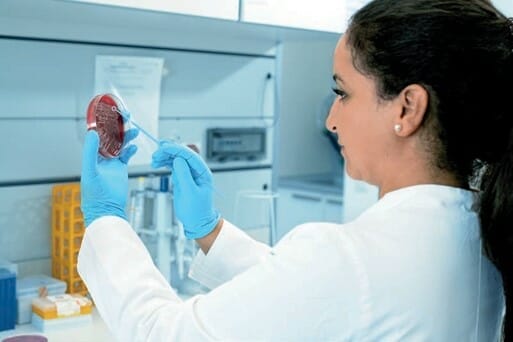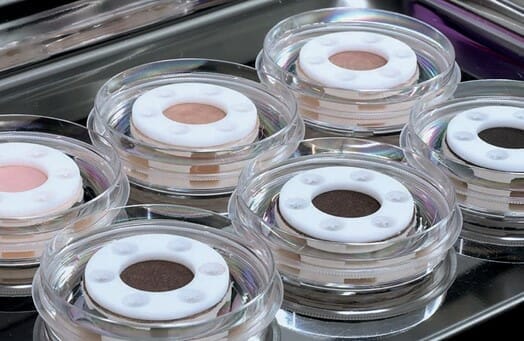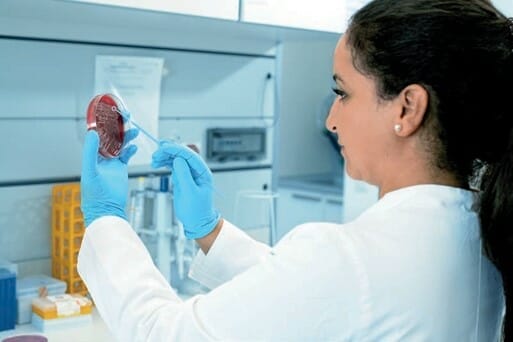
Author’s Note:
The cosmetics and personal care industry, innovation is a constant. Consumers have been conditioned to seek newness; brand leaders launch products to address the challenges of the moment; and scientific discoveries happen every day, advancing what’s possible in and beyond beauty. Here, I outline just 5 of the emerging science topics and product formulation trends that I’ll be following and writing about this year in my Global Perspectives column here for EURO COSMETICS Magazine.
“Phage tech, oral wellness and smile care,
new ideas in sun care, advances in clinical testing, and next-gen cannabinoids are just some of the beauty innovations I will be watching in 2023″
Phage Technologies for Skincare
It seems as if every beauty maker right now is marketing microbiome skincare products. Industry leaders including L’Oréal, P&G, and DuPont have been researching and developing skin microbiome science with practical applications in beauty for more than a decade now. Nonetheless, “the research within the world of the microbiome is still very early,” as Elsa Jungman PhD, Founder and CEO of HelloBiome, told me for the Global Perspectives column on Advances in Microbiome Beauty Science that ran in the September 2022 issue of this magazine.
Some scientists believe that bacterial viruses are the way forward. Brands like Phyla Skincare and Gladskin as well as ingredient innovators like Biocogent and Lysando AG are working with phage technology to address consumer skin concerns such as acne. ‘Phage’ is short for bacteriophage; a type of virus that infects bacteria to perpetuate its own existence and in doing so eliminates the host bacteria.
Lysando AG, for instance, specializes in the development of antimicrobial proteins – proteins that selectively eliminate bacteria. The company’s Artilysin Platform Technology has applications in multiple industries, including personal care and cosmetics. And,in a recent interview, Chairman Markus Graf Matuschka von Greiffenclau spoke with me about Lysando’s unique approach to phage technology.

Under normal circumstances, a phage attaches to its particular host bacteria at a receptor site; and then coerces the bacteria to generate more copies of that virus. “The phage, at the end of its cycle,” explains Graf Matuschka von Greiffenclau, “needs to break out of the bacterial envelope to spread … They have two elements holins and endolysins; and these, in cooperation, break up the cell wall from the inside so that the bacteria gets opened and [the virus] can spread.”
To understand the Artilysin Platform Technology, it’s important to know that the cell wall of bacteria are stabilized, in part, by a cluster of ions. Lysando’s technology exploits that intrinsic electrical charge. “What we do is take the endolysin – it’s a very small molecule about 40kDa (kilodalton) – we take this endolysin and we manipulate it.”
By giving the endolysin a positive electrical charge, “we can attach our endolysin any place on the target bacteria,” Graf Matuschka von Greiffenclau tells me. “We destabilize the bacterial cell wall by [means of] the electric charge; and then by osmotic pressure, the bacteria will burst.” Through this mechanism of action, the targeted bacteria strain is eliminated and the skin condition it correlates to is significantly resolved.
Of course, the technology is much more complex than all of that; over the past 15 years, Lysando AG has secured hundreds of patents and developed some 450 prototypes. And there is much more to come from this company and others working in phage technology.
Oral Wellness & Smile Care Innovations
Oral care sits neatly at the intersection of health and beauty, which is why ingredient makers like US-based Ingredion are now helping oral care brands get in on the waterless and solid formulation trend with product prototypes like Fresh Bite Toothpaste Tablets.
It’s why brand’s like Gallinée – recently acquired by Shiseido – are bringing microbiome beauty and oral care together with products like Prebiotic Toothpaste and a Mouth & Microbiome Supplement. And why brands like Korea-based SALTRAIN are helping introduce mineral-rich gray salt to mainstream oral care consumers with its toothpaste formulations.
At the same time, we see Ireland-based Spotlight Oral Care (a brand founded by dentists, a product portfolio flush with conventional oral care products and tools) offering skincare: a $180 Smile Rejuvenation System, complete with a derma-roller tool, a Pro Regeneration Serum, and a Lip Sheet Mask.

The Beauty of Sunlight
The skincare benefits of daily SPF protection are now widely known; and more and more beauty consumers have made sun care a part of their regular routine. So it follows that companies across the cosmetics and personal care industry are developing new sun care ingredients.
SPF boosters are becoming quite common. Dow, for instance, offers a line of ingredients called SunSpheres that boost SPF or raise UV protection. And according to the company site, these ingredients are well suited to both sun care and complexion product formulations.
Perhaps even more compelling is the January 2023 launch of Nectaria Lithops, a trademarked ingredient that helps optimize the skin’s own production of vitamin D. Inspired by the functionality of Lithops pseudotruncatella (a succulent native to South Western Africa sometimes called ‘living stones’), the team at Spain-based Vytrus Biotech developed the new active using their in-house expertise in plant stem cell technologies.
Alejandro Guirado, Communication and Marketing Manager at Vytrus, shared press materials with me that explain how “Lithops pseudotruncatella is able to maintain levels of water and healthy cells during extreme periods. Its secret weapon is its sugar structuration. Along with a peculiar metabolism, this sugar structuration enables the plant to capture the light necessary for … underground photosynthesis without compromising the water balance of the plant.”
There are apparently similarities between this underground photosynthesis and vitamin D synthesis in human skin. So, “by developing a biotechnology platform (Phyto-Glucidic Fractions) based on plant sugars, Vytrus created Nectaria Lithops. The biophysical mechanism of action of this active ingredient, made from Lithops stem cells, consists of the optimization of the skin microenvironment to stimulate the vitamin D production by the cutaneous cells,” explains the company’s press materials.
And a sun care innovation that promises to surprise and delight is in the works at US-based expressive biology company Arcaea. In a mid-January interview with Dylan Dreyer of NBC’s Today, Arcaea CEO Jasmina Aganovic shared this sun care news: “This is strange to say, but fish don’t get sunburned. And it turns out they have this molecule that we don’t have as humans. What we’re doing is studying that molecule and creating it through fermentation so that we don’t have to extract it from fish and looking to bring that to market in sunscreens.”
Advances & Opportunities in Clinical Testing
It takes more than new ideas, new ingredients, and new product innovations for better beauty benefits to become reality. Clinical testing methods, technologies, and protocols are tremendously important tools for developing effective products.
GeneMarkers, for instance, a US-based genetic research company that supports the personal care and pharma industries with testing services, has developed testing methods that make it possible to assess and quantify the effects that blue light exposure has on skin. The company recently published research on one such testing method in the International Journal of Cosmetic Science with the title, “Reproducible method for assessing the effects of blue light using in vitro human skin tissues.”
As authors Rishabh Kala, Nicole Heiberger, Heather Mallin, Stephanie Wheeler, and Anna Langerveld note in that article’s abstract, “Gene expression and protein biomarkers were measured using qPCR, ELISA and immunohistochemical (IHC) methods.” And their research concluded that “consistent blue light exposure produced skin damage via alterations in biological pathways that are associated with skin ageing.” This method of assessment can then be used to determine the benefit of ingredients and products developed to mitigate blue light damage.
Another company in the clinical testing space is doing work focused on the importance that skin’s physiological or mechanical tension plays in how it responds to ingredients, products, and treatments. Based in Scotland, Ten Bio is intent on “transforming skin research with … advanced ex vivo human skin models,” according to promotional materials that Founder and CEO Robyn Hickerson shared with me late last year.
TenSkin is the company’s real human skin model, which is cultured under tension that “[restores] skin’s inherent mechanobiology” and “retains skin’s physiological complexity, metabolic activity, and structural integrity,” staying viable for as long as 2 weeks, “allowing research teams to make more informed decisions at every stage of R&D,” according to Ten Bio.
Next-Generation Cannabinoids
Cannabinoid beauty is here to stay and companies around the world are making important advances to ensure that these newly popular ingredients are available at the quality and scale that our industry requires.
This past October, for instance, US-based Purissima announced the launch of its biotech Cannabichromene (CBC), a minor cannabinoid known for its anti-inflammatory benefits. Minor cannabinoids are simply those found in small amounts in cannabis – small compared to the amount of CBD and THC. Purissima leverages microalgae and fermentation to produce cannabinoids at industrial scale.
“The effectiveness of CBC in both topical and ingestible formulations is a testament to the clear advantages that algae fermentation brings to the natural sourcing of hard to access ingredients,” believes Robert Evans, Purissima Co-Founder and Chief Business and Strategy Officer. “Versus plant sources of CBC, algae fermentation offers reliable and repeatable purity and dosage as well as a vastly more sustainable profile,” he told the press in late 2022 when the company launched its CBC to the market.
Looking Forward at 2023 Emerging Science and Formulation Trends
Phage tech, oral wellness and smile care, new ideas in sun care, advances in clinical testing, and next-gen cannabinoids are just some of the beauty innovations I will be watching in 2023.

If you’re shaping the future of beauty science – working on new ingredients, manufacturing processes, or product formulations that will impact these and any other emerging science and formulation trends – let me know: hello@deannautroske.com

Deanna Utroske
Deanna Utroske is Editor of the weekly Beauty Insights newsletter and one of the most well-respected critical thinkers in the cosmetics and personal care industry today. She serves our industry as a public speaker, writer, and consultant for supply-side companies.
As a regular contributor to this publication, Deanna writes the Global Perspectives column, covering cosmetic and personal care product formulation trends, emerging ingredient science, and ingredient marketing trends impacting the future of beauty around the world.
As a public speaker, Deanna addresses company teams, higher-education classrooms, and event audiences. She’s spoken at Cosmoprof Worldwide Bologna, in-cosmetics global, MakeUp in Los Angeles, NYSCC Suppliers Day, the Anti-Ageing Skin Care Conference, the International Cosmetics Innovation Conference, Cosmoprof North America, the AIRS International Conference on Genomics & Microbiomics, and many others.
Learn more and find a link to subscribe to the Beauty Insights newsletter at www.DeannaUtroske.com



